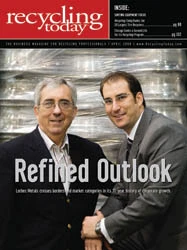Serving industrial accounts can be where the volume is for scrap dealers, but it can also provide significant transportation challenges.
In the 1950s, scrap dealers who served large industrial accounts may have had to invest in either numerous small- to medium-sized containers or a fleet of trailers to keep large factories serviced.
While larger containers existed, they typically had to remain mounted on a trailer through much of the journey, as equipment that could easily maneuver a container on and off its trailer was not widely in use.
As early as the 1930s, suppliers such as the Dempster brothers in Knoxville, Tenn., were among those developing systems for the solid waste industry, but these were not always ideal for scrap metal applications.
"If a company was generating large, bulky scrap, you had to either leave entire trailers or go there every day to pick up a smaller lugger box," says Marvin Rosenberg, a long-time scrap processor from Coldwater, Mich.
Marvin says his brother Sam Rosenberg, who co-owned Tri-State Scrap in Louisville, Ky., along with Harry Kletter, was among those who popularized the roll-off system.
The evolution and eventual popularity of roll offs helped to address a service challenge for scrap recyclers. "The lugger system lifted boxes straight up and around," says Marvin. "So you couldn’t pick up large containers. I would say possibly a 5-yard container was about as big as you could go."
That presented a difficulty when servicing large-scale scrap generators, "especially [those generating] bulky stuff," recalls Marvin.
The challenge also affected profitability. "Those trailers, with tires and everything, were very expensive. Before the roll off, you had to have a whole fleet of trailers. That was several thousand dollars at that time, plus a license for each, plus insurance . . . it really added up quickly."
NOWBeing in the right place at the right time can be a fortunate thing, as Sam Rosenberg and Harry Kletter learned in the 1950s.
The co-owners of Tri-State Scrap in Louisville, Ky., were often able to benefit from concentrating on the hauling aspects of their jobs, as well as from buying surplus military equipment from nearby Fort Knox.
Sam says Ford Motor Co., a Tri-State customer, prompted the company to adopt innovations such as compactors and roll-off trucks and trailers.
"We developed a container with rollers on the front and a way to hook onto it in the front," recalls Sam. "Then, even with just a cable hoist, you could lift as much as 50,000 pounds."
Keeping the trailer from tipping at too high of an angle when loading was important, as was the introduction of dual hydraulic cylinders to do the heavy lifting rather than a cable hoist. The dual-cylinder design, still largely in use today, "made it a lot cleaner and a lot simpler," says Sam. "We were able to improve the mounting qualities of the hoist itself without that central spool in the middle of the bed."
Sam and his Tri-State co-workers also designed compactors and modified existing trailer designs, such as some of those it encountered in the surplus military equipment stream. "The Army Corps of Engineers at Fort Knox had a piece of equipment that actually was similar to the tow trucks you see today to tow front-wheel drive vehicles," says Marvin Rosenberg, Sam’s brother and a long-time scrap processor from Coldwater, Mich.
Tri-State worked with other business owners around the country to introduce its container and trailer models to the waste and recycling industries, with several of those companies still serving the industry today.
A large fabricator today such as Benlee Inc., Romulus, Mich., offers several styles of roll-off trailers, with load capacities of up to 80,000 pounds or even 141,000 pounds for a multi-axle model.

Explore the April 2008 Issue
Check out more from this issue and find your next story to read.
Latest from Recycling Today
- Athens Services terminates contract with San Marino, California
- Partners develop specialty response vehicles for LIB fires
- Sonoco cites OCC shortage for price hike in Europe
- British Steel mill’s future up in the air
- Tomra applies GAINnext AI technology to upgrade wrought aluminum scrap
- Redwood Materials partners with Isuzu Commercial Truck
- The push for more supply
- ReMA PSI Chapter adds 7 members





